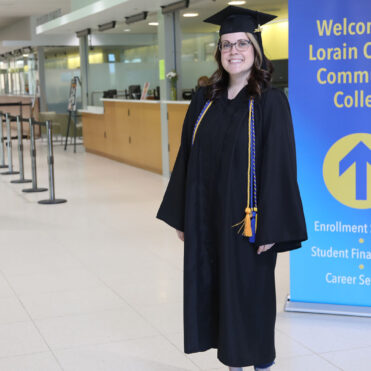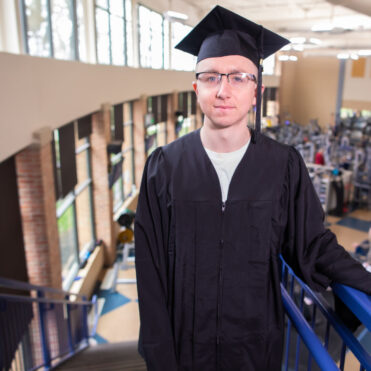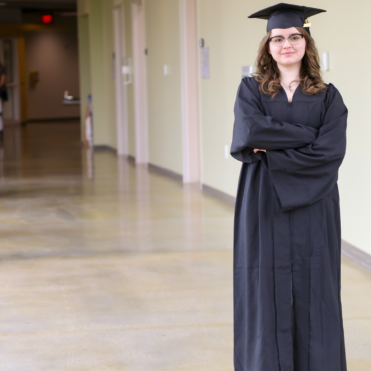To those
who trailblaze
a new career
Brandon Filker, DeAndre Lurry and Jared Dumont are the first three graduates of LCCC’s bachelor’s degree in microelectronic manufacturing (MEMS).
None of them came to Lorain County Community College knowing exactly what they wanted to do, but all three are leaving with on-the-job experience, endless opportunities for growth, and a more confident version of themselves. And a history-making degree.
Brandon Filker, DeAndre Lurry and Jared Dumont are the first three graduates of LCCC’s bachelor’s in applied science degree in microelectronic manufacturing (MEMS). It’s a class they never expected to be part of, but they can’t imagine having made a better career-building choice.
Dumont initially chose LCCC because it offered the most transfer credits from his time in the military. He served in the Army Reserve for eight years as part of a Combat Support Hospital, troubleshooting and repairing hospital equipment. When he returned home, Dumont got a job at the Cleveland Clinic, specializing in diagnostic radiology. He enrolled at LCCC to further his career, but felt his interest dwindling.
“I was in the advisor’s office, enrolling in classes for a degree I wasn’t incredibly interested in, when I saw the curriculum guide for the MEMS program,” Dumont says. “I changed my major the next day.”
Dumont, along with Filker and Lurry, found their way to the college’s associate degree program in MEMS, which had launched in 2014. Then, in 2018, LCCC became the first community college to offer a bachelor’s in applied science degree in MEMS. All three enrolled.
“I was going to be finished with school after my associate degree, but then I had the opportunity to be one of the first students in Ohio to be in the program, and I just had to do it,” Filker says. “Now I have so many opportunities to pursue a career locally in MEMS.”
Local job opportunities certainly are abundant. The MEMS program has had 100 percent job placement for its graduates, in part because regional employers had a hand in designing it.
“This degree is tailored to what companies want,” Lurry says. “So you know you’re getting hands-on and direct skills to set you up for a career.”
But on-the-job success doesn’t have to wait until graduation. All three gained experience and earned an income while in the program. This “learn and earn” model is engrained in both MEMS degree programs and boosts students’ confidence.
Lurry has been an intern at Lincoln Electric since May 2019. He began in research and development, helping to conduct tests for the company’s welding products. Since then, he’s moved into the electronics area, making programs for machines on the surface-mount technology line, which manufactures the company’s production printed circuit board that go into their welding products.
“Lincoln Electric has given me more skills and understanding of how design processes work when developing and manufacturing a product,” Lurry says.
That experience gives local companies confidence, too, that graduates are prepared to enter a rapidly changing workforce. Lurry already has an engineering technologist position waiting for him upon graduation.
Filker, who has worked full time in MEMS-related positions during his entire education, received a job offer from Q-Lab Corporation in March. He’s now an electrical assembly technician, building the electrical components of the company’s UV testers, preparing sub-assemblies, and soldering.
“My job opportunity there came directly from connections through LCCC,” Filker says.
The same goes for Dumont, who landed his job as operations manager and process engineer at PCBx through an interesting twist of fate after convincing his nephew to join the MEMS program.
“A friend of his asked if he knew anyone who was proficient in surface mounted technology and could possibly run a pick and place machine,” Dumont says. “These were terms he learned in the Intro to MEMS class his first semester so I became a part of the conversation.”
After Dumont’s nephew connected him to the company, which fabricates custom printed circuit boards, assemblies, and wire harnesses, Dumont interviewed and began working there the next week. And as Dumont learned subject matter in the lab, he applied it immediately in his career. He sees a long-term future with PCBx.
“I plan to continue working with this company for as long as I am capable,” Dumont says. “They have plans to standardize their procedures and grow their capabilities. The degree specific classes are almost a playbook for setting a company up to expand and I aspire to be an integral part of that growth.”
Dumont, Filker and Lurry certainly are poised to be integral parts of the companies they work for and the entire industry as they blaze a new trail in MEMS education.
“Words can’t even explain what this program has meant to me,” Lurry says. “I don’t know anywhere else where I could get a four-year specialized degree in the microelectronic manufacturing field. Not only that, but at a community college where it’s affordable.”
And in trying something new, these three have learned not only new skills, but about themselves, their potential and their futures.
“I discovered the value of investing in myself,” Dumont says. “I was able to chip away at the raw material I used to be made of, to find the value that I am. I’ve never been happier than I am these days and it’s in no small way because of this college and the opportunities it’s opened for me.”



